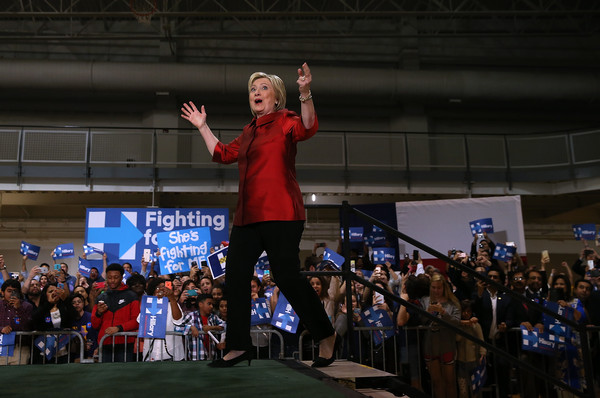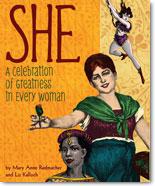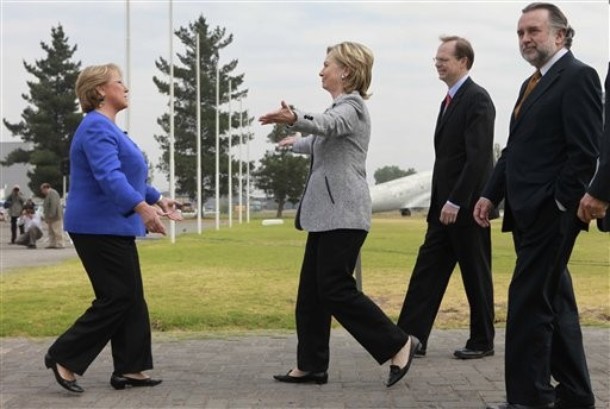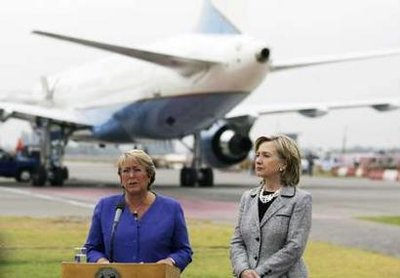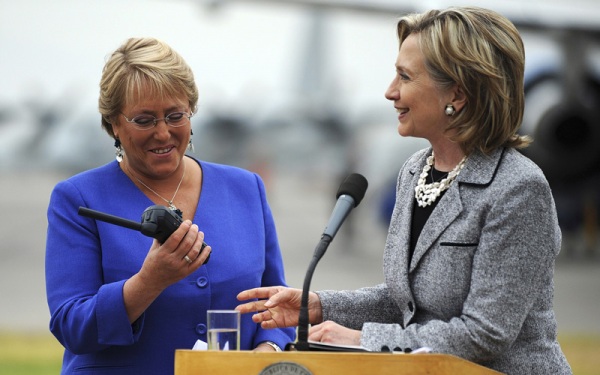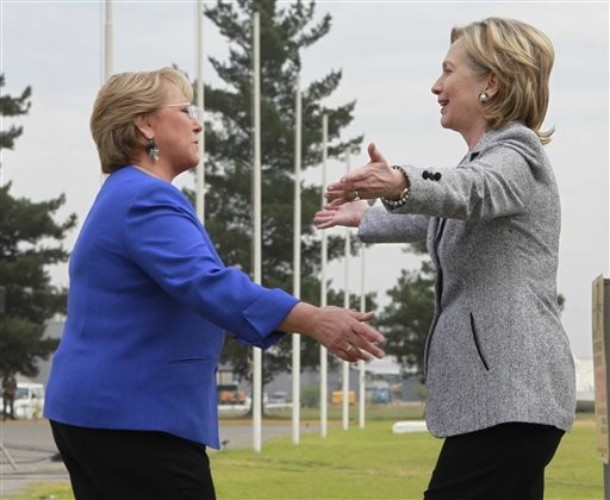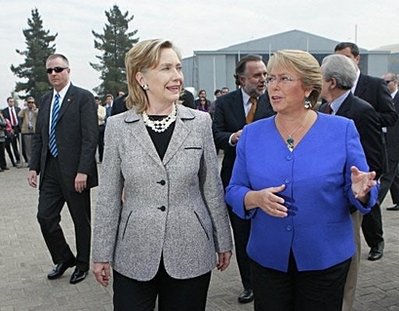SECRETARY CLINTON: Well, indeed, it is a pleasure to welcome all of
you here to the State Department to what we call the Ben Franklin Room.
Ben is right up there. He was probably our first well known innovator,
and we think it’s especially appropriate that we would hold this
occasion in this room with him looking over us.
I want to thank Ambassador Verveer and her team for all the work that
they have done in putting together these awards and in recognizing the
importance of innovation in transforming the lives of women and girls
around the world.
Over the past three years, we’ve been focused intently here at the
State Department on the challenges facing women and girls, and we’ve
done that not just because we think it’s a moral imperative and
absolutely historically necessary. We’ve done that because we really
believe that transforming the lives of women and girls transforms
societies, countries, and our world. So we ask ourselves all the time
how to create economic opportunities, how to improve women’s social and
cultural standing, how to open up governments and political processes to
women.
It is, for us, part of what we call “smart power.” The full
participation of women is essential in order to raise the GDPs in every
economy in the world, including our own; essential for achieving the
peace and security objectives of American foreign policy; and we know
that working with women and on their behalf can open doors for
employment, healthcare, and education, which have ripple effects that
lift entire communities, foster peace, prosperity, and stability.
But all that potential goes untapped when women have few resources
and little support. That’s why two years ago, the State Department
partnered with the Rockefeller Foundation to establish the Innovation
Award for the Empowerment of Women and Girls. Now, these awards support
our most creative thinkers and committed activists. Under the leadership
of Dr. Judith Rodin, the Rockefeller Foundation understood that we
could, together, enhance our impact and help unleash potential that
would otherwise not be available.
So the innovations we’re supporting today help overcome some everyday
challenges. For example, if women farmers in impoverished areas can’t
afford irrigation equipment to grow profitable crops, how do we work
with them to put the right tools at the right price in their hands? If
jobs are out there but out of reach, what does it take to connect women
with employers? If women and girls face dangerous and unpredictable work
conditions, how can we help them organize, speak out for themselves,
demand the protection and compensation they deserve?
We really believe – in fact, we know – that targeting specific
problems with carefully tailored solutions can pay enormous dividends.
Now, there are people who have been doing this for a long time around
the world. One of them served on our screening committee for the awards,
Muhammad Yunus. We’ve seen the difference that creative innovations can
make, but we’ve also been absolutely amazed at what combining social
media and the internet with good ideas can do to actually increase
exponentially the impact of what our efforts are. So these awards may be
facing age-old problems, but they are coming up with 21st century
innovations.
Now, it’s only possible for us to do this because of strong,
effective partnerships. Government can’t do it alone, the private sector
can’t do it alone, civil society can’t do it alone. So what we’ve done
is to try to bring people together in these partnership networks. That’s
why we set up the Secretary’s International Fund for Women and Girls,
which enables us to work with private sector partners to target funding.
It’s why we created the incredible partnership office here so that we
can work with a wide variety of partners. And with this award, the
Rockefeller Foundation is fulfilling the promise of the International
Fund for Women and Girls.
Now, I want to have just a moment of personal privilege here, because
it’s exciting to see these three young women sitting here on this
stage. I will be introducing them one by one as our award winners. But I
think it’s very important to recognize that we have to empower young
people – young men and young women. So we have begun a big youth
initiative here at the State Department, and I rolled it out and
announced it in Tunis about two weeks ago. Because honestly, innovation
is a young person’s game, by and large. (Laughter.) So I want to
encourage – I see some young people out there. I want to encourage you
to take this work and just keep thinking and building on it.
So let me now begin by recognizing our awardees. These are innovators
who are making a difference in India, Kenya, and Tanzania. These are
people who looked at a problem and said, “I refuse to accept this. I’m
going to do something about it.” And after I introduce each one, I’m
going to ask them to say a few words to you, because obviously it’s more
important to hear from them than it is for me.
Now, most Indian cities rely on workers from the informal sector to
recycle their waste. These workers represent a small part of the
population, but what they do can reduce a city’s waste by 20 percent.
This is dangerous, dirty work – picking through garbage to remove
recyclable material. Exposure to toxins and pollutants put their health
at risk.
At the same time, the industry receives absolutely no formal legal
recognition. There’s no system for protecting workers from danger or
ensuring that they are treated fairly. Chintan, an Indian nonprofit, is
working on the ground to train and organize waste pickers and to
eliminate child labor from their ranks. This group is advocating for
those who work in the informal sector, pushing for recognition, basic
protections, and fundamental dignity.
Chintan’s efforts have reached more than 20,000 waste pickers in
India in the past five years. More than 2,000 children have been pulled
out of the trash heaps and put on a path toward education and
opportunity. Chintan’s work in advocacy and research has expanded beyond
local concerns and is helping change the way we understand informal
labor sectors around the world.
It is also a stark reminder about why we must protect and advocate
for the rights of workers to organize. In advanced economies, it is
sometimes easy to forget what used to happen in our own factories, on
our own shop floors, in so many industries where, yes, children were
exploited and people’s working conditions were dreadful.
So, for all of these reasons, it is a pleasure to welcome Chintan’s
founder, Bharati Chaturvedi. Thank you so much, Bharati. (Applause.)
MS. CHATURVEDI: Secretary of State Clinton, Dr. Rodin, on
behalf of all these women and young girls who scavenge through the
Indian middle class’s trash, I want to thank you for acknowledging them.
The organization that I work with, Chintan, creates green jobs. We
convert waste into social wealth, not just wealth. And these women I
work with, their children don’t go to school. It’s hard for them to get
in because there’s a lot of discrimination, and they experience a new
kind of untouchability, even though what they’re doing is recycling our
trash in a country that’s becoming more and more affluent.
We will use this award to get a lot of young girls into school out
the trash heaps, but also create more and more green jobs for women
waste pickers. But most of all, because poor women feel and experience
the brunt of climate change, we also want to talk about how they can be
foot soldiers in the battle against climate change. And through green
jobs, we can really transform how cities in India – and India is an
urbanizing country – how they experience just being better, more
equitable cities and more inclusive of these people.
And we hope that this recognition helps us get Indians to recognize
and embrace and acknowledge waste because – and realize that their work
is important, not only for the recycling, but also because it makes our
existence on this planet more sustainable. (Applause.)
SECRETARY CLINTON: Thank you so very much for what you’re
doing. And I also just want to make sure everyone knows and to announce
that each of these recipients will receive $500,000 to assist them in
their work. So we’re making a very big investment in each of these
programs because we believe in their missions and we believe in their
leadership.
Now, around the world there is an unmet demand for digital service
jobs, tasks that can be performed online anywhere in the world for
companies in the United States and elsewhere. In the world’s most
impoverished areas, as many as 70 percent of the population is
unemployed, but the people there don’t have the training or education or
the technology to do the jobs that online digital jobs can provide.
In Kenya, Samasource is approaching this problem from two angles:
first, providing women and girls with the training they need to do these
online jobs; second, providing access to the internet so that this
untapped workforce can connect with a waiting job market. So far,
Samasource has connected more than 2,000 women with these jobs.
This new way of bringing opportunity to impoverished areas has gotten
a lot of attention. Samasource is partnering with investors like the
Ford Foundation, the eBay Foundation, and Google.org. I had the
privilege of meeting its founder last fall and was very intrigued and
impressed by what she was doing. I had no idea that she was going to be
selected for this award, but I am delighted that she has been. And I
want to welcome to the podium and introduce to you Leila Janah.
(Applause.)
MS. JANAH: So a couple of days ago I was in San Francisco and I
visited my favorite spot, which is the MLK Memorial in the center of
the city. And I re-read one of Dr. King’s most favorited quotes. He said
in 1964, “I have the audacity to believe that people everywhere can
afford three meals a day for their bodies, education and culture for
their minds, and dignity, equality, and freedom for their spirits.” And
that was the year that we passed the Civil Rights Act. But now, 50 years
later, women are still so far from achieving their economic potential
in the world. Women account for 66 percent of the world’s output, and
yet earn less than 10 percent of the income, and own less than one
percent of the property. That’s a one percent that we don’t hear very
much about these days. (Laughter.) So I think today’s award ceremony is
really about turning that around. We are so thrilled to accept this
award from three visionary women, Secretary Clinton, Dr. Rodin, and
Ambassador Verveer, who have each devoted a substantial part of their
lives to advancing women and girls.
We plan to use this transformational grant to employ one thousand
women across our centers in East Africa through microwork, which is an
innovative model that connects them directly into the supply chains –
the digital supply chains of some of the world’s largest companies, like
Intuit and eBay. And what’s really amazing about our program is that,
beyond just the income, these women start viewing themselves as equal
members of society. They start voting, they start demanding equal access
to things, they start investing in the health care and education of
their children. I really look forward to the day when Dr. King’s belief
does not seem so audacious, particularly for the 50 percent of the
world’s population that’s currently waiting to unleash its potential.
Thank you so much. (Applause.)
SECRETARY CLINTON: Thank you, Leila. Now in Tanzania, women
farmers cannot often afford the tools they need to irrigate their crops,
which makes it much harder to keep their crops healthy and profitable,
especially during the dry season. So a few years ago the NGO, KickStart –
I love that name, KickStart – developed the MoneyMaker Hip Pump.
(Laughter.) It costs about $30, it looks sort of like a big bicycle
pump, and this new irrigation tool allows women to grow fruits and
vegetables throughout the year. It’s lightweight and easy to use. And
now KickStart has introduced a micropayment program so that women can
pay for it over time if they need to.
This initiative is transforming agriculture for women in Tanzania and
I predict soon will across the continent and the world, because if you
just stop and think, that 60 to 70 percent of the small-hold farmers in
the world are women, this has enormous potential. I think the last
figure we saw was, as of January, nearly 30,000 pumps have been sold.
This is a model that can be replicated again and again. By harnessing
technology and spurring entrepreneurship, KickStart is changing the way
we work to alleviate poverty and promote development. So I’m very
pleased to present the Secretary’s Innovation Award to KickStart, and
I’d like to invite Anne Otieno to accept the award. She is Tanzania’s
Country Manager.
Anne. (Applause.)
MS. OTIENO: Thank you so much. I’m really honored to be here.
It’s actually my first time in America. It’s a great honor to really
come and receive this award on behalf of KickStart Tanzania. But I just
want to share with us a little bit about what we do back at home in
Tanzania. Like, you’ve already heard – that in rural Africa, 80 percent
of them are poor farmers. And out of that, we at KickStart, we have
introduced the MoneyMaker pump which has helped many to start
agribusiness through irrigation, because many families in Africa wait
for the rain. But when they’re able to irrigate their land, they’re able
then to start to grow high value crops, which means that they’re able
to sell crops when nobody else is selling, they’re able to get access
for their crops, which is not so during the rainy season because
everybody else is already doing it.
So in KickStart Tanzania, we’ve been able to work with women. We’ve
seen many of the women being able to lift their lives out of poverty by
starting small agribusiness through the MoneyMaker pump. The only
obstacle around it has been, women have to save for it – they have to
save for like eight months to be able to buy the pump. Now with the new
layaway mobile system that we want to start, we will be able then to
turn around and get many women to be able to get the pumps within two
and a half months – about 10 weeks. And so that way, we will be
empowering more women to get out of poverty. Thank you so much.
(Applause.)
SECRETARY CLINTON: Thank you. Well, I have to say that this is
one of these programs that gets me very excited and encouraged, because
we are answering needs, fostering innovation, helping to recognize
young leaders like these young women. And we couldn’t do it alone. We do
need partners and I want to invite my friend and my partner, Dr. Judith
Rodin, to the podium. Judith’s visionary leadership at the University
of Pennsylvania, now at the Rockefeller Foundation, is opening up a lot
of space to do things that just were not even imagined in the past. So
Judith, please.
MS. RODIN: Thank you so much. Let me begin by thanking
Secretary Clinton and Ambassador Verveer for their extraordinary
leadership, not only as really living wonderful examples of the
embodiment of achievements of women, but also for their enduring
commitment and empowering others and raising awareness of so many of the
world’s most pressing and most important challenges, particularly those
facing women and girls.
I’d like to congratulate this terrific group of winners. This is the
inaugural Secretary’s Innovation Award for the Empowerment of Women and
Girls. And you’ve heard from them and you can understand why we’re so
excited about them. We are thrilled at the Rockefeller Foundation to be
able to provide the funding for these awards and to be associated with
these amazing group of innovators. And we believe that with this half a
million dollars, there can be really acceleration of what are wonderful
models, bringing them further to scale. There are so many terrific
pilots that falter because of that lack of next-step funding, and when
we talked about what this award could do, we really felt that we could
take some of those pilots and give them that accelerating capital that
would move things forward and begin to help taking it to scale. And it’s
critical that we do more of that.
For almost 100 years now, the Rockefeller Foundation has been
enabling innovations and investing in innovation that have led to huge
improvements in the well-being of humanity. From funding an unknown
scholar named Albert Einstein to catalyzing the field of public health
around the world, to creating the green revolution in Asia, the
Rockefeller Foundation has always been committed to identifying and then
supporting innovation, scaling them and applying them to the most
pressing challenges facing humankind.
The innovators here today have made great strides in one of these
critical challenges: the empowerment of women and girls, particularly in
the developing world. But as Leila said, the story is far from over.
The problems facing women and girls worldwide are still very real. We’ve
heard the statistics about work. We know that 70 percent of the world’s
one billion people living in poverty, still living in poverty, are
women. And we know that despite the fact that the majority of the
producers of food, the growers of food in the developing world are
women, they make up 60 percent of the chronically hungry.
At the Rockefeller Foundation, one of our primary objectives is to
expand opportunity for more people in more places around the world. And
so I’m particularly delighted that these three winners are really
focusing on economic empowerment. Chintan’s innovative work on green
jobs and advocacy and organizing in India is an incredible example of
really bringing all of these things together. I’d like to again, take a
moment of personal privilege and express Rockefeller’s special pride in
the other two award winners because they are or have been our grantees:
Samasource and KickStart, doing extraordinary work that you’ve heard
about.
These award winners really demonstrate the power of innovation to
accelerate the well-being of humanity, and it is exciting to see three
young women sitting here because they hold the keys to the future. I
want to thank Secretary Clinton again for using her inimitable star
power to shine a light on these organizations and for challenging all of
us to continue to support innovations like these and to bring them to
scale to ensure that their benefits are shared by more people around the
world. That is really how we will ultimately solve these pressing
global challenges. Thank you. (Applause.)
AMBASSADOR VERVEER: So this brings us to the end of our
ceremony this morning, but to the beginning of greater innovation and
impact around the world. We congratulate our awardees, wish them well,
thank them for what they’ve done and will continue to do. We thank Dr.
Rodin for this collaboration. And of course, we thank our Secretary for
her extraordinary leadership. Thank you all for joining us. (Applause.)










